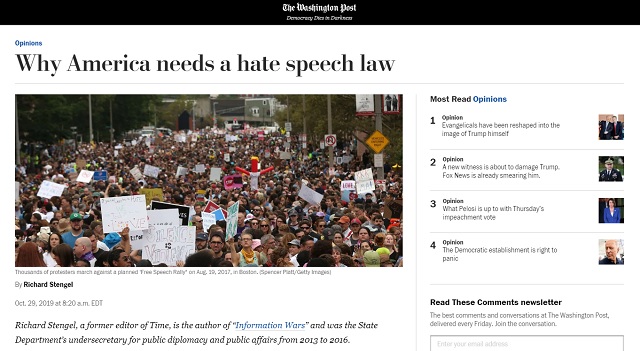WashPo: 'Why America Needs A Hate Speech Law'Chris MenahanInformationLiberation Oct. 29, 2019 |
Popular 
Kentucky Rep. Thomas Massie Introduces 'Dual Loyalty Disclosure Act'

Sen. Schumer: 'My Job is to Keep the Left Pro-Israel'

Trump Pulls Stefanik Nomination for U.N. Ambassador Over Fear GOP House Majority Could Evaporate

Trump Strong-Arms Another Law Firm Into Giving Millions in Pro-Bono Work to 'Combat Antisemitism'

Randy Fine, Who Celebrated Israel Killing An American Citizen, Struggling in Florida House Race
  America needs to scrap the First Amendment to fight the Russians and protect the feelings of minority groups as the Founding Fathers would have wanted us to do, according to a column published Tuesday in the Washington Post. America needs to scrap the First Amendment to fight the Russians and protect the feelings of minority groups as the Founding Fathers would have wanted us to do, according to a column published Tuesday in the Washington Post.Former State Department official, TIME Magazine editor and Atlantic Council distinguished fellow, Richard Stengel, wrote in The Post: Why America needs a hate speech lawTranslation: "We're desperate to regain control of the narrative and need to start throwing dissidents in prison for thought crimes if we hope to turn this ship around." That’s partly because the intellectual underpinning of the First Amendment was engineered for a simpler era. The amendment rests on the notion that the truth will win out in what Supreme Court Justice William O. Douglas called “the marketplace of ideas.” This “marketplace” model has a long history going back to 17th-century English intellectual John Milton, but in all that time, no one ever quite explained how good ideas drive out bad ones, how truth triumphs over falsehood.It's truly hilarious hearing the biggest liars on the planet in a paper controlled by the world's richest man claim they're guardians of "truth" and the "free press" while calling for people to be imprisoned for thought crimes. Domestic terrorists such as Dylann Roof and Omar Mateen and the El Paso shooter were consumers of hate speech. [...]How about we "experiment" with sedition laws for those who want to undermine the Bill of Rights instead? Follow InformationLiberation on Twitter, Facebook, Gab and Minds. |



